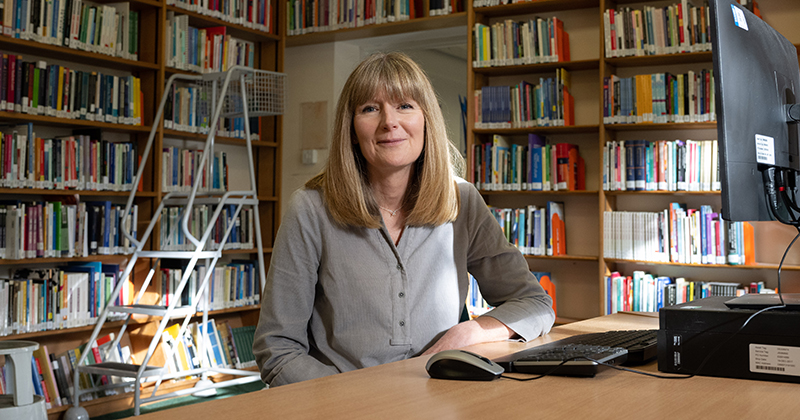Dr Michelle Meadows was second-in-command at Ofqual during the 2020 exams fiasco, a grading disaster that will echo for years to come. She reveals to Samantha Booth what happened behind closed doors …
Dr Michelle Meadows is used to a grading crisis. She helped to handle at least five that hit the headlines in her two-decade career at exam board AQA and qualifications regulator Ofqual.
But perhaps none was as big as the 2020 pandemic grading fiasco. As Ofqual’s deputy chief regulator until last year, Meadows was deeply involved in creating the unprecedented alternate awarding system for grades when exams were cancelled.
So much has been written about what went wrong: from government pressure for Ofqual to ensure grading standards were in line with previous years to communication failures and a lack of public trust in the regulator.
Meadows says that with hindsight it is “easy to say that was a policy mistake”. But Ofqual was being pushed to the limits of its remit as a regulator during 2020, with just four months to roll out the alternative plan.
“Ofqual stepped into a role that was not really what it was set up to do,” Meadows tells me from her University of Oxford office, where she is now an associate professor and course director of a masters in educational assessment.
On the other hand, she accepts Ofqual – and importantly government ministers – should have been out there “explaining, explaining, explaining”.
School reports were “pretty indifferent”
Born in the north west, Meadows describes herself as a “problem-solver”. Working in regulation was the dream as it’s “problem-solving on a day-to-day basis”.
For someone who ended up working in education, though, the 54-year-old admits her own academic performance at her comprehensive was “truly unremarkable”.

“If you look back at my school reports, they were pretty indifferent. I had a very ambivalent relationship with the whole business of being educated.”
But she was nevertheless put in the “upper” stream for O-levels, something she now questions “because there was no standardised assessment”.
After obtaining “average” O-levels, she did A-levels at Stockport College, also the alma mater of Labour’s deputy leader Angela Rayner.
One thing she did know from 13 was that she wanted to be a psychologist. She scraped two Cs to study at Hatfield Polytechnic in Hertfordshire and became the first person in her working-class family to go on to tertiary education.
Although psychology is hugely popular now at A-level (there was an 11 per cent rise in entries last year), it was an unusual choice in the 1980s. Her college didn’t even offer it as an option.
Her parents – a shorthand typist mother and electrician father – had both studied at technical colleges so going to university was a “mystery, but a serious thing”.
Her love of education really began at 19. She credits this, and a chance to retake A-levels, as her driver for “fairness and second chances” in life, adding: “I wouldn’t have had the opportunities that I had.”
“I feel very strongly that for the vast majority of students, how they do …. in terms of their qualifications, it’s just a reflection of them – a snapshot – at that point in time.”
After graduating, she worked as an assistant psychologist at St Mary’s Hospital in west London and completed a PhD in driver behaviour before unexpectedly helping to create the “blueprint” for the national speed awareness course in Lancashire.
She was perfectly happy working in academia, but wanted a “good chewy problem” and was hired as a senior researcher at the exam board AQA in 2002.
The first crisis in 2009
“I did not know what I was getting myself into at all really,” Meadows reflects, arriving to see staff exhausted from the demanding curriculum 2000 reforms on post-16 education.
Her first crisis came in 2009 when Ofqual, the new regulator in town, decided to lower grade boundaries in GCSE science at AQA, as grades couldn’t be aligned across the boards.
The second was in 2012 with grading the-then modular GCSE English, which led to a High Court judicial review by 150 schools, 42 councils and 167 pupils. Many received lower than expected results.
It boiled down to the qualifications structure, which the judge said was “the source of such unfairness”.
Meadows says the modular structure allowed some schools to do the exam in January and wait until June to take coursework. This meant some were “able to work out what mark their students needed to get the magic grade C”, which “broke the awarding process”, making grade boundaries higher than usual.
Meadows says at first it was difficult to spot what was causing the issue. But a bright researcher dug into the data and found huge spikes on grade boundaries for those schools that took the exams early.

Meadows thinks the Michael Gove reforms to linear GCSEs made sense as the qualification modules were too small, and the introduction of more grades through the 9-1 system gave more meaningful information on a student’s performance.
But she thinks it’s a “great shame” that AS courses are now fading away, narrowing post-16 study for some students.
“That fabulous feedback mechanism at the end of year one has now been removed,” she says, adding “a lot of people working in education would welcome” it back.
From exams are on to schools shutting…
Meetings began with exam boards and the Department for Education in early March 2020, just as the Covid pandemic was spiralling. Meadows had been promoted to deputy chief regulator, as well as overseeing the risk and research teams.
Early meetings were about how to spread out exams to mitigate any disruption.
“We were working out how to make exams work. Almost overnight we went from exams will go ahead in some form to, oh, schools are shut. It just proved impossible for exams to go ahead.”
At the outset of creating a standardisation model, Ofqual knew some grades would have to be downgraded with estimates of 30 per cent (which was similar to UCAS predicted grades).
While it worked to keep results in-line nationally, it was disastrous for many pupils.
In the end, almost 40 per cent of grades awarded by teachers were pulled down after going through the standardisation model.
Come results’ day, with pupils in tears on television over how their grades had been unfairly hauled down by this faceless regulator, Ofqual and ministers – who had made the decision to standardise grades – were forced to make a U-turn.
Consultation with the sector before drawing up the model was “incredibly positive”, but Meadows says there was a difference between “theoretical propositions and practical realities”.
“We knew it would be problematic and in our risk analysis we had identified a probability that the public wouldn’t accept these grades,” she says. “But having said that, we had four months to deliver something, so we were heads down trying to create the best possible model in no time whatsoever.”
Meadows says what was unexpected was the extent to which different schools and colleges would behave in “different ways”. Some tried to “pre-standardise” to try to reduce the chances of downgrading; others awarded many A* and As despite previously having a full range of grades.
“[Results day] took a massive toll because whatever we think about Ofqual I can hand on heart say they are good, earnest people trying to do the right thing. It felt like Ofqual was hated, that we were somehow incompetent or evil. Neither is fair at all.”
Meadows takes particular aim at a Daily Mail article on chief regulator Sally Collier, who resigned after the fiasco, as being “deeply unpleasant and personal”. The article included details of Collier’s marriage.
Collier is one of five chief regulators in Meadow’s seven years at Ofqual. “That is a lot of turnover, and I think speaks to the difficulty of doing the job. You can be guaranteed that within your three or five-year term, you’re going to have one big doozy of a crisis or you’re going to have something where you disagree with government.
“It makes it tremendously difficult. That’s a terrible shame as it puts experts off doing these jobs.”
Warning over T-Levels
A large part of Ofqual’s work is regulating vocational and technical qualifications. But this wasn’t always the case, Meadows says, as the regulator mainly focused on general qualifications when it launched.
“Now it’s totally transformed. The problem is regulation has to be risk-based – and there are 200 awarding organisations offering 18,000 VTQs and they are enormously disparate.
“You can’t have infinite resource to regulate all qualifications equally, you’ve got to make some difficult choices.”
While Meadows has “some sympathy” for the view the vocational landscape is too complex, she says the need to “really weed out” qualifications is “incredibly resource intensive”.
She worries “a lot of faith” is being placed in T Levels. “I would personally be treading very carefully and want to make gradual changes… which never fits the political cycle. There’s always a desperate desire to want to do things quickly and that’s understandable not just from a political perspective, but also if you believe that something isn’t working well, you want to fix it.”









Your thoughts